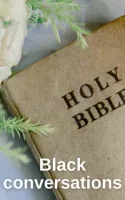A few weeks ago, I watched a conversation on Mzansi Magic which was chaired by Rorisang. On the panel was Bishop Joshua Maponga, Jackie Phamotse. These are known figures that discussed a topic that reads ‘Should an African that is Christian praise his or her ancestors?’. The conversation on Mzansi Magic made me think about my grandmother who was a herbalist and currently embracing both ancestors and the bible. In this reflection exercise, I will be sharing how the conversation replicated aspects of my grandmother’s life and my own.
My grandmother once told me that we are all praising one God and that for us, ancestors mediate for us to God. Bishop Maponga argued that Christians are hypocritical for judging people that believe in ancestors when they also worship ancestors from the bible. They are engaged in traditional rituals such as accepting Christ and baptism. I find that some Christians tend to fail to recognise these are similarities.
Furthermore, Maponga argued that African Christians tend to forget that the bible was used as a tool for colonialism. Therefore, the teachings that came with it during colonialism were to disorientate people from their beliefs. He advises that Africans who are Christians must be critical of the bible so that they do not reinforce colonial practices. On the other hand, Rorisang argued that she does not believe in ancestors, but she believes in the bible. To me, Rorisang’s argument was of interest because it demonstrates a population of people who are content with how things are.
I deduced that often Christians hold a belief that Bantu people who believe in ancestors are misguided and are bound to go to hell. The people that hold both Christianity and ancestral beliefs are often reprimanded for misleading the public, especially if they are a bishop or a pastor.
This made me reflect about my grandmother who used to be a herbalist. As a herbalist, she would generate muti, a natural medicinal substance that enables people to overcome their life situations. She found Christ and stopped being a herbalist. Her reasons for finding Christ were that we all pray to one God, but we have ancestors that mediate for us in the other world. Furthermore, she stated that she had to stop being a herbalist because it came with complications. Sometimes people did not believe in the potency of her muti, and they had unreasonable expectations such as rapid results. When the muti finally works, they do not return to her and offer her gratitude.
Currently, she is a regular church member, and she practices ancestral rituals when the time arises. It is my grandmother who encouraged me including my brothers to join a local church. She even ensured that we are baptised, and we are saved in the name of Jesus Christ.
I deviated from Christ the day after I was saved because I was expecting a surge of power to penetrate my body just like the movies when an individual gained new powers. I was disappointed when this did not happen. However, I was young, and I did not understand what the ritual meant. I learned that I was no different from the people that did not believe in the muti my grandmother administered. I also learned that any form of religious belief requires that one believes to see the effectiveness of it. Ultimately, bishop Maponga made me realise that accepting Christ is a ritual, it is not different from a ritual whereby you seek guidance from ancestors. We are praising one God and ancestors mediate for us. It is important to research about your belief even when you are content with the information you have.
This piece was written as part of the Fundza Fellowship Programme.


